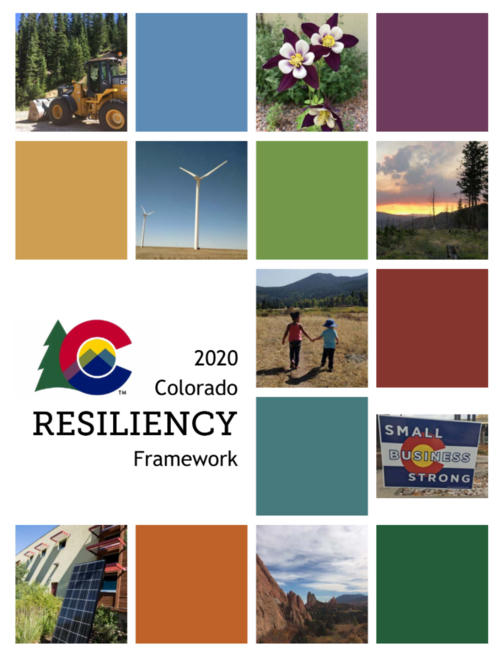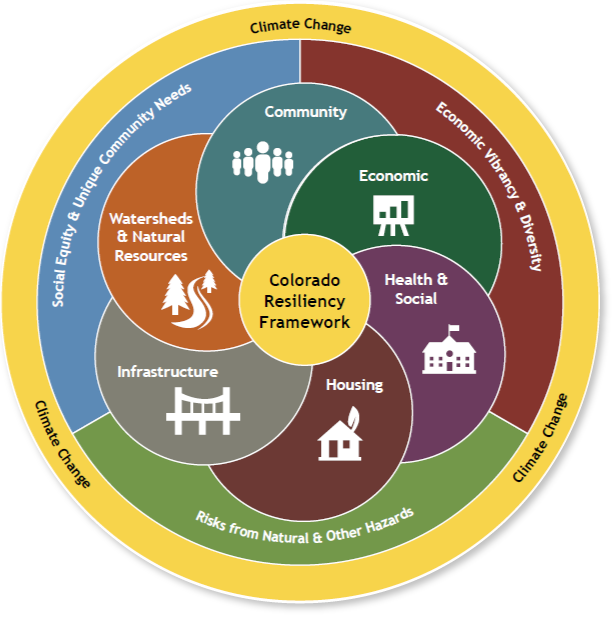Colorado Resiliency Framework
The Colorado Resiliency Framework is a plan to help the State become stronger and more prepared for the future. It explains the State’s goals for dealing with challenges and looks at risks in four key areas: adapting to climate change, understanding natural and other hazards, addressing social inequalities and community needs, and growing a strong economy. The Framework outlines 29 strategies in six priority areas that the State will use to reduce risks and adapt to changes in the environment, society, and economy.
We are updating the Colorado Resiliency Framework in 2025.
What is the Colorado Resiliency Framework?
After the wildfires in 2012 and floods in 2013, Colorado realized it needed to plan ahead for future disasters to protect people, property, and jobs. The original 2015 Colorado Resiliency Framework showed the state’s commitment to rebuilding in a way that moves forward from challenges.
The updated 2020 Colorado Resiliency Framework is a plan for making Colorado more prepared for the future. It outlines the state’s goals and looks at risks in four key areas: adapting to climate change, dealing with natural and other hazards, addressing social issues and community needs, and growing a stronger economy. The Framework provides 29 strategies in six main areas that Colorado will follow to lower risks and adjust to environmental, social, and economic changes.
Throughout the Framework, risks are studied, and specific plans are laid out to help the state and local communities become more resilient. Two main strategies—creating a statewide program for resilient communities and finding funding for resiliency efforts—are key to connecting and strengthening all of the state’s goals.
The Colorado Resiliency Office (CRO) and the Colorado Resiliency Working Group (CRWG) guide the 2020 Framework and work to build partnerships, collaborate, and improve resiliency across the state.

 Resiliency Framework Sectors
Resiliency Framework Sectors
The key to achieving resilient and sustainable communities is to consider the six resiliency planning sectors below as an integrated framework; each of these sectors is an integral part of a larger, resilient whole. Hazards that affect one sector are likely to have direct and indirect effects on other sectors and, likewise, strategies will have a cross-sector impact. These sectors are the lenses through which we view resiliency throughout Colorado, and we seek to implement solutions that provide benefits across multiple sectors.
Build community capabilities and resources that coordinate and integrate resiliency, equity, and disaster recovery planning efforts and facilitate social connectivity and empowerment, especially focusing on marginalized populations.
Address Colorado’s toughest challenges through regionally diverse, coordinated education and capacity-building that generates a skilled workforce and overall innovation economy that is adaptive and agile.
Dismantle structural inequities and integrate efforts across health and social service networks to empower communities, expand access, and improve health outcomes and wellness for all Colorado residents.
Implement a collaborative strategy to create sustainable, affordable housing solutions that address the needs of the whole community while preparing for and responding to changing environmental, social, and economic conditions.
Improve the resiliency and sustainability of infrastructure in Colorado by prioritizing resilience and integrating social equity, investment, planning, and mitigation and recovery efforts across jurisdictions.
Protect, enhance, and restore Colorado’s watersheds and natural resources, consistent with scientific understanding, community priorities, and environmental laws.
Resiliency Priorities
The Framework defines six priority areas in which the State and local communities can take action to enhance resiliency and ensure a vibrant and livable future for all Coloradans. Within each priority, there is a specific goal that the Framework supports, as well as a series of strategies and actions to support the goals. Continue navigating to the priority areas below to learn how CRO will accomplish the goals within the Framework.
Agriculture & Food: Cultivate a robust state and local food system, from agriculture to distribution and consumption.
Buildings & Infrastructure: Reimagine and modernize Colorado’s built environment to be both climate and hazard resilient, and environmentally sustainable.
Climate & Natural Hazards: Reduce Colorado’s risk from climate change and natural hazards through integrated land use, ecosystem, and natural resource planning, management, and investment.
Community Capacity: Empower Colorado communities to improve local resilience, equity, and capacity.
Future-Ready Economy & Workforce: Fortify Colorado’s workforce to support a future-ready, regenerative, circular economy.
Housing Attainability: Increase the supply of attainable housing throughout Colorado, including affordable housing options for workforce populations and those who most experience marginalization.
